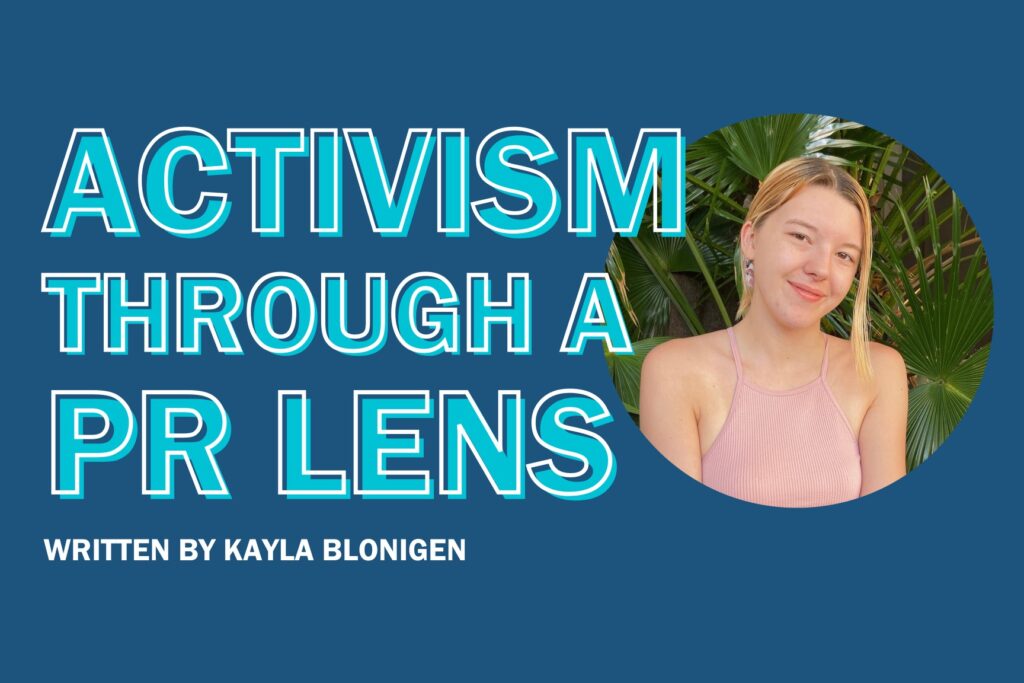Activism Through a PR Lens

We live in a world where activists and protesters are around every corner. On numerous occasions, this could be a wonderful thing that leads to changing America for the better. However, not all protests are civil and not all activists have a loud enough voice to be heard by the audience they need to conduct change. Businesses and corporations have had their fair share of social justice for quite some time, but with social media, it has become much more publicized. This brings us to ask: how does public relations play a role in activism?
There are a great deal of activists in the world, but unfortunately, not all have a grand enough platform to express their views and consequently make a difference. On the other hand, when brands that we have grown to love start expressing their take on a social cause through social media, we tend to listen. Increasing public engagement with societal issues is seen as a beneficial strategy for many public relations representatives. Although it has been proven to increase sales and attract consumers, many businesses claim their reasoning behind this is “because it’s the right thing to do.” According to the USC Annenberg Center for Public Relations 2022 Global Communication Report, “The Future of Corporate Activism,” 73% of organizations say they will increase their public engagement in a dialogue around one or more social issues in the coming years.
Since the summer of 2020, corporate activism has never been the same and will never be the same again. Due to the racial justice protests, many companies who had not spoken out publicly about race prior did their part in the fight; now — according to the report — almost 80% of public relations professionals claim that their companies have since stuck to their commitment of expanding their diversity and inclusion efforts. Those in the public relations industry realize — now more than ever — how important it is to not only say the things their consumers want to hear, but to also follow through with these promises. PR activism is not enough when all it consists of is a statement or image in support. It must be authentic.
Many companies have tried activism from a PR lens, but not all were successful. According to the report, Patagonia and Ben & Jerry’s were ranked as the top two brands to effectively communicate their corporate purpose. Patagonia, for example, has been participating in corporate activism for roughly the past 50 years, long before it was “cool.” In 1990, the company made a stellar donation to Planned Parenthood, which angered many at the time. Due to this, they received constant complaints to their customer service line. Instead of moving backwards and regretting this act of social justice, they proceeded to donate an additional $5 to PP for every negative comment they received. Although pretty common for businesses these days, in the ‘90s, it was unheard of for a major consumer brand to choose a side on such a controversial issue.
In 2021, Corley Kenna, a spokesperson for Patagonia, told the LA Times, “It’s worth losing a few customers — we always gain more when we take one of these positions.” Choosing a side in a debatable matter may be daunting for most PR executives due to the risks at stake. This is a huge part as to why a majority of CEOs are not 100% devoted to corporate activism. As a matter of fact, 45% of in-house communicators say that their department or team has faced resistance from management when it comes to incorporating social issues into communication programs. PR agency CEOs, on the other hand, are much more proactive than their clients when it comes to activism. Unfortunately, the PR agencies normally don’t have nearly as large of a platform.
The 2022 Global Communications Report survey showed that 96% of public relations students believe that all businesses should do their part to help solve societal issues. This implies that the next generation of PR professionals are more likely to choose a company based on their core values instead of the value of the company. They will judge their career on the change they are able to make in this society. The survey also showed that PR students believe the number one trait their generation should have to be successful is social consciousness; however current professionals think the most important trait they should possess is critical thinking.
It is extremely important for professionals to start looking at activism through the PR lens. These corporations have strong, well-built platforms and they need to start using their large audience to better the country. The fear of losing consumers should not defer anyone away from making a difference in others’ lives. No matter how hard some activists try, they will never have the followers that well-known companies such as Apple and Target possess. That’s why corporate activism plays an enormous role in societal issues and more organizations need to step up and get behind the fight.

Kayla Blonigen is a junior journalism major at Suffolk University. In addition to her previous experience as a political affairs intern for the Borgen Project and a marketing intern for K2 Venture, Kayla is currently serving on the PRSSA National Publications Committee.
